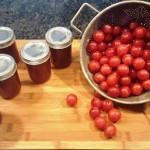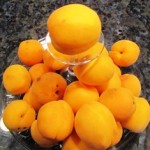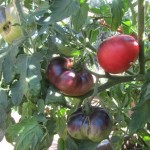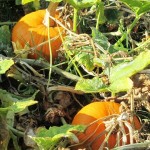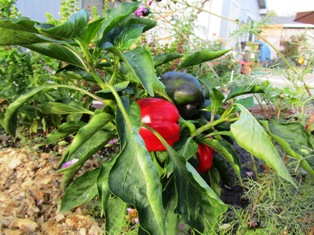Bless Others with Your Backyard Bounty
I called my neighbor just after sunup this morning and asked her to come help me pick plums. I have trees of ripe plums, three different varieties, as well as apricots that are ripening too fast for me to keep up with drying and jam-making.
She came laden with a dozen boxes. I had ladders and buckets and bowls ready. We were soon joined by her husband who also brought a ladder. We picked until the containers were full and still the trees held a ton of fruit.
He backed up their van and we loaded the fruit containers inside. They would drive the containers full of fruit to our local food pantry–the Contra Costa County Food Bank Warehouse at 4010 Nelson Avenue in Concord to distribute to needy families.
Saying thanks didn’t seem adequate enough, so I took my neighbors to my veggie patch to find some items just for them. I promised to deliver pumpkins when they were ready but for now we found heirloom zucchini, summer squash, and tomatoes.
Their gift of time and energy spent picking and packing fruit and delivering it to the food bank freed me up to start my jam-making. A friend once told me that what blesses one blesses others. It certainly proved true today.
If you’re interested in donating fresh food from your backyard garden, contact the Contra Costa Food Bank warehouse, located at 4010 Nelson Avenue, Concord, CA 94520 or call 925. 676.7543. Hours are Monday through Thursday: 7 a.m. to 7 p.m. Friday: 8 a.m. to 3 p.m. Saturday and Sunday: 8:00 a.m. to 3:30 p.m.
If you don’t have lovely, helpful neighbors who will assist you harvesting your bounty, contact gleaners in Contra Costa County at www.theurbanfarmers.org
_____________________________________________________________
If you enjoy reading this blog about my Henny Penny Farmette activities, check out my cozy mystery series (A BEELINE TO MURDER, MURDER OF A QUEEN BEE, and A HIVE OF HOMICIDES) as well as my current nonfiction books.
All are available online at Amazon, Barnes and Noble, and Walmart as well as traditional bookstores everywhere. The cozy mysteries are chocked full of delicious farmette recipes, tips of keeping honeybees and chickens, and farm trivia.
Learning about GMO Food Safety
You might assume your zucchini and sweet corn is safe to eat but what if it was grown from GMO-treated seed, able to withstand an herbicide or even produce an insecticide as it grows? What happens in your gut when you eat that corn? What happens to animals fed such corn? These are questions that scientists, doctors, consumers, food safety advocates, and environmentalists all grapple with in their concern about GMO food safety.
The Non-GMO Project is a nonprofit organization concerned with GMOs and food safety. It explains on its Web site that a genetically modified organism (GMO) is a plant or animal that has been “genetically engineered with DNA from bacteria, viruses, or other plants and animals.” That means it is an anomaly in nature as such experimental combining of genes of different species does not occur in traditional crossbreeding or in nature (http://www.nongmoproject.org/learn-more).
Consumers might not be getting all the facts of what is known and what science is discovering about the health concerns of many Americans eating foods that contain GMOs. Estimates suggest that 80 percent of U.S. processed foods contain GMOs, meaning millions of Americans are eating foods that might not be all that safe to consume. Research into links between GMO consumption and ill health are ongoing but already GMO-altered foods, whether plants or animals, are raising health concerns.
Seed suppliers say that interest in non-GMO corn seed is growing among farmers because of lower costs, better animal health, and higher yields as well as increasing disenchantment with genetically modified traits of GMO seed (http://www.non-gmoreport.com/articles/january2013/Demand-growing-for-non-GMO-corn-seed.php)
With summer on the horizon, many people are planting seeds or seedlings in their gardens or are anticipating the plentiful vegetables available at produce stands and in supermarkets. But read the labels on all those mounds of squash, tomatoes, peppers, and potatoes.
Potatoes and tomatoes are considered low-risk for GMOs by the Non-GMO Project, that is, those two vegetables are not currently being genetically engineered. Although many people might think wheat is a concern, the Non-GMO Project states that wheat is not now nor ever has been genetically engineered, unlike soy, cotton, sugar beets, alfalfa, canola, zucchini, and summer squash.
More than 60 countries, including most of the developed nations, have banned or restricted GMOs. The United States is the exception, allowing production and sale of such products to continue. Consumers, scientists, and environmentalists opposed to genetic manipulation of plants and animals say avoidance and boycott of such products are consumer choices even as legal battles against bio-tech giants and anti-GMO advocates move through the courts.
As for summer corn, the best option might be to grow your own from heirloom seed that has not been genetically maniuplated. Otherwise, buy corn certified as non-GMO or from sources that support organic farmers and food sources such as Whole Foods and other organic markets. Check out the offerings for seed at Seeds Now (http://www.seedsnow.com/pages/shop-all-seeds).
 Facebook
Facebook Goodreads
Goodreads LinkedIn
LinkedIn Meera Lester
Meera Lester Twitter
Twitter






